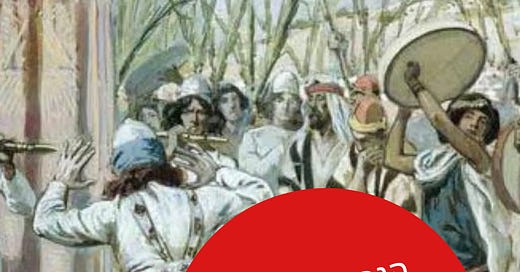Music matters not just to our souls but to the very balance of the spheres, the purpose of the planet.
The Zohar, cornerstone text of Jewish Kabbalah states that
"All songs and praises of the Levites would rise and open gates in the heavens."
Maybe that’s why there was such emphasis on the musical presence at the ancient temple and so many other religious traditions, then and now.
And maybe that’s why there is such emphasis in this book on King David’s role in making sure the music matters and its makers get a place of honor.
The biblical narratives include traditions about David’s origins as a skilled musician whose voice had healing qualities. He sang to soothe the soul of Saul and some say he composed some of the Psalms.
So when it comes to today’s chapter he also gets the credit for creating the system of musical making in the temple -- including the lottery that would determine the order of the levitical households in charge of daily psalms.
As in the previous chapter where 24 units are created to make sure there are always priests on duty, so it was for the levites who would stand alongside the altar and sing praises to drown out the animals’s groans and uplift the moment for the pilgrims. Here there is also an attempt to level the playing field so that all the levites can get a chance:
וַיַּפִּ֜ילוּ גּוֹרָל֣וֹת מִשְׁמֶ֗רֶת לְעֻמַּת֙ כַּקָּטֹ֣ן כַּגָּד֔וֹל מֵבִ֖ין עִם־תַּלְמִֽיד׃
They cast lots for shifts on the principle of “small and great alike, like master like apprentice.”
I Chronicles.25.8
Expert and apprentice, all take part of the great chorus. But did these men offer more than music to make the ritual more powerful or memorable?
This chapter suggests that they were extremely powerful - their music brought about prophecy.
A surprising word appearing here hints that what they had to offer was beyond the ordinary chords:
וַיַּבְדֵּ֣ל דָּוִיד֩ וְשָׂרֵ֨י הַצָּבָ֜א לַעֲבֹדָ֗ה לִבְנֵ֤י אָסָף֙ וְהֵימָ֣ן וִידוּת֔וּן הַֽנִּבְּאִ֛ים בְּכִנֹּר֥וֹת בִּנְבָלִ֖ים וּבִמְצִלְתָּ֑יִם וַֽיְהִי֙ מִסְפָּרָ֔ם אַנְשֵׁ֥י מְלָאכָ֖ה לַעֲבֹדָתָֽם׃
David and the officers of the army set apart for service the sons of Asaph, of Heman, and of Jeduthun, who prophesied to the accompaniment of lyres, harps, and cymbals.
I_Chronicles.25.1
These three households are familiar - they are be mentioned in the Psalms as composers of epic chants, some still known and popular today. It’s quite amazing actually.
This verse lists their names and instruments but not their secret recipes. How did they practice prophecy through their music?
What was the purpose and did they replace the old prophets who used words, not songs, to deliver divine messages, not always soothing and in tune with what folks wanted to hear?
Robert Alter explores this riddle:
“The verb here is a little surprising. From several reports in the Book of Samuel, we know that wandering bands of prophets in the early biblical period used musical instruments to work themselves into a vatic frenzy (a phenomenon that can still be observed among “Holy Rollers” in the United States). In this case, the verb for immersing in ecstasy is the same root but in reflexive conjugation. Here, the passive conjugation (nif’al) occurs, which is the form used when the so-called Literary Prophets deliver their message. One may infer a kind of domestication of ecstasy in the temple music: it induced an elevated state, and the words sung--probably the set words of psalms--were regarded as a kind of gateway to the sacred. Thus in verse 3, Jeduthun is said to be “prophesying with the lyre, acclaiming and praising the LORD,” and those paired verbs appear regular in the psalms of praise.”
The gateway to the sacred -- what Alter refers to as ‘domestication of ecstasy’ is what must have made these rituals so special and mood-altering. Today, we still turn to music for a lot of different things including relaxation but also as a way to tune within and to connect to higher, deeper states of being.
Rabbi Dalia Marx adds a comment on this verse:
“Although singing was not the main thrust of the religious rites it has a special value, one that David knew well. He understood that the divine must be worshipped with joy and pleasure and not just according to obligation and observance, that can at times be dull and uninspiring. Who, like David, knows that sometimes music can reach the inner chord of the soul and heal broken hearts?”
We need more sacred music these days, to help elevate us, to help heal all broken hearts.
We may not have the temple techniques or those priestly prophetic playlists but it’s good to know we have such rich traditions of songs, and so many new ones, to mark our small and big milestones with sounds and silences that give us a beat and bring us tears, smiles, deeper connection and higher hopes.
Below the Bible Belt: 929 chapters, 42 months, daily reflections.
Become a free or paid subscriber and join Rabbi Amichai’s 3+ years interactive online quest to question, queer + re-read between the lines of the entire Hebrew Bible. Enjoy daily posts, weekly videos and monthly learning sessions. 2022-2025.
Become a Paid Subscriber? Thank you for your support!
#Chronicles #BookofChronicles #IChronicles
#hebrewbible #כתובים #Ketuvim #Bible #Tanach #929 #דבריהימים #labshul #belowthebiblebelt929
#Ichronicles25
#sacredmusic #propheticmusic #ecstaticdance #Psalms #davidthemusician #Zohar #ancientpriestsofisrael #musicmatters #shamanicmusic #levitesband
#peace #prayforpeace #nomorewar #stopthewarnow




Thank you for all this background! I am nevertheless sad that there is no corpus of liturgical music comparable to Christian masses. As best as I know, it's only Salomone Rossi and then later, liturgical composers in the 19th century.
Thank you for streaming the echoes of ecstatic music to my morning